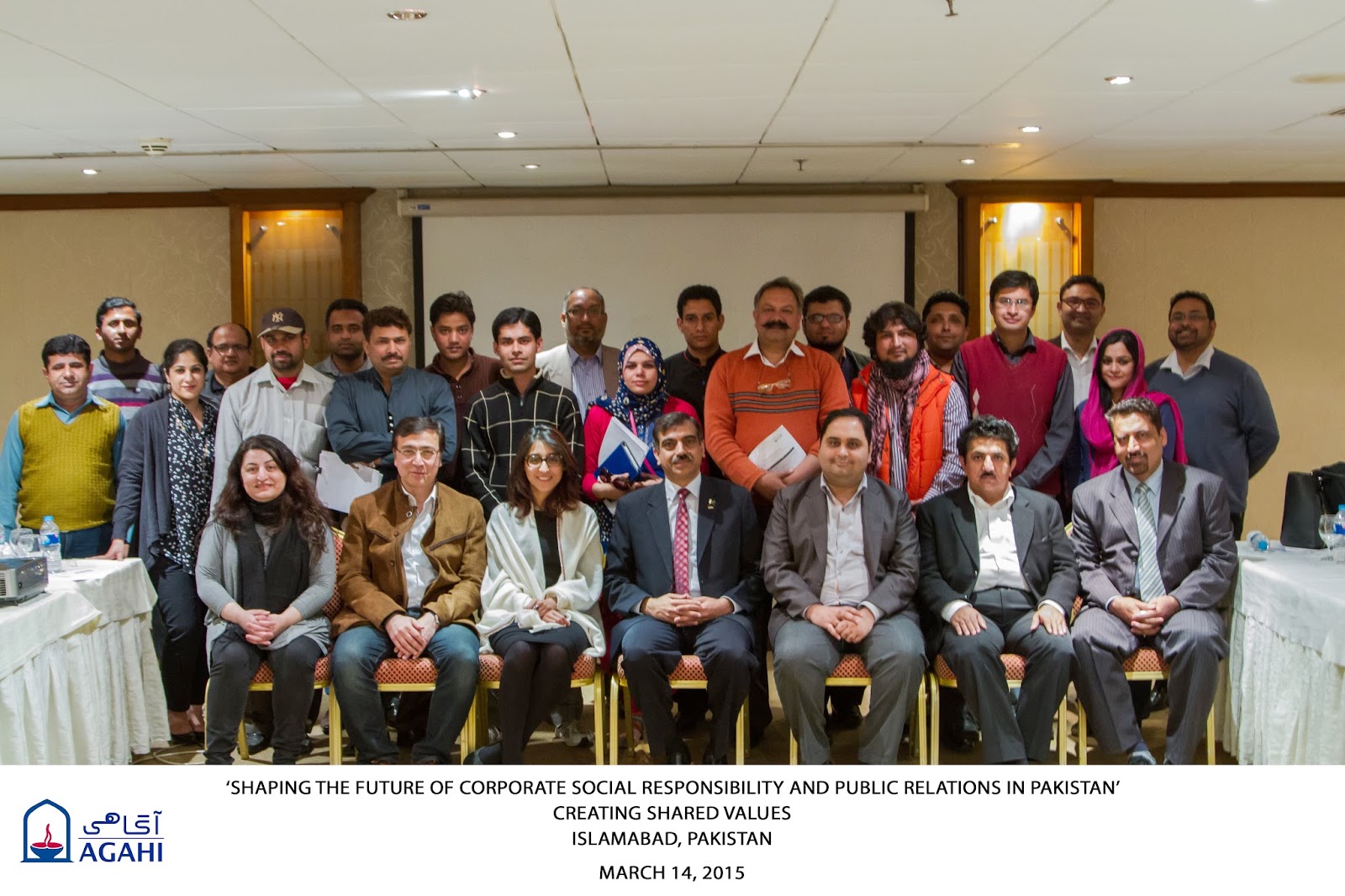All Stakeholders Need to Join Hands to Improve Quality of Life in Pakistan.
Future socio-economic well being can only be ensured if business entities, government institutions, media and communities work towards creating shared values.

Islamabad, PK – 14 March 2015 - Creating value for the citizens by engaging communities in the process of business, transparency and accountability was discussed today at a roundtable dialogue at Marriott Hotel in Islamabad organized by AGAHI. The roundtable discussion on how organizations can create value for their stakeholders focused on the future of corporate social responsibility and public relations in Pakistan. The dialogue brought together the journalists’ community and the corporate sector to explore the scope of Creating Shared Value (CSV) in promoting socio-cultural norms, protection of socio-geographic environment and ethic-driven business practices, sharing government responsibilities, and ensuring transparency in managerial practices in Pakistan. The speakers and the participants shared the challenges their organizations faced ensuring the Corporate Social Responsibility (CSR) and Public Relations (PR) vision while meeting the profit bottom line.
Puruesh
Chaudhary, Founder & President AGAHI, said that the dynamics within which the
businesses are operating in are evolving at an incredible pace; drivers of
change being innovation and technology. The philosophy that is re-determining
the functions of communications for socio-economic and improvements in human
condition is a collective responsibility of all stakeholders. She further added
that, “creating shared value as a separate category for the Agahi Awards -
Beyond 2015 is a reason to highlight journalistic efforts for assembling
information and knowledge on corporate social responsibility, social
entrepreneurship, dignity, interfaith, and media ethics.”
Creating shared value (CSV) is a business concept first introduced by Prof. Michael E. Porter, a leading authority on competitive strategy and head of the Institute for Strategy and Competitiveness at Harvard Business School, and Mark R. Kramer, Kennedy School at Harvard University and co-founder of FSG.
"The future prosperity for society lies in creating common shared values for all stakeholders collectively, businesses and government need to cater and ensure socio-economic dividends for their respective communities and clientele", said Amir Jahangir, Young Global Leader World Economic Forum.
Senior strategic communication expert, Hina Akhtar said that, many see CSR as a PR tool but if you look at it from a broader perspective, CSR is a commitment to operate as a responsible business entity, whereas a business’s primary objective is to gain financial profits, a responsible organization measures its success beyond these financial gains.
Colonel (R) Waheed Hamid, Director Communications Fauji Fertilizers Company (LTD), Hina Akhtar, Chief Executive Officer, Gold String Communications, Imran Sheikh, Educationist, Executive Vice President JS Bank, Dr. Ansir Ali Rajput Educationist and Amir Jahangir, Young Global Leader of the World Economic Forum shared their views the benefits and challenges of engaging communities and other stakeholders for good business practices. A large number of business and economic journalists also attended the round table discussion.
AGAHI is a not for profit organization established in Islamabad in 2011 under the Society Registration Act 1860. Its primary function is to create non-paid communication strategies, content intelligence structures, development collateral and tools for diverse sectors and organizations. AGAHI encourages and advises individuals and institutions in pursuing and supporting initiatives to improve the state of development in Pakistan. It works on developmental frameworks facilitating information and knowledge sharing platforms on understanding challenges in global perspective. Its research work mainly focuses on national and international security, ICT, competitiveness, human capital development, and governance. AGAHI in association with several leading national and international partners focuses on creating shared spaces for interactive learning, collaborative thinking, and knowledge sharing. AGAHI is at the forefront of devising foresight research and future scenarios work in Pakistan.
This year AGAHI, celebrates AGAHI AWARDS – Beyond 2015 by recognizing best reporting practices on categories such as: Business & Economy (Competitiveness), Creating Shared Value, Disaster and Catastrophe, Education, Gender, Health, Youth Empowerment, Human Rights, Infotainment, Innovation Journalism, Judiciary, Millennium Development Goals, Journalism for Peace, Photo Journalism, Entrepreneurship, Sports, Energy, Water, Agriculture, Environment, Foreign Policy, Foresight and Futures. businesses are operating in are evolving at an incredible pace; drivers of change being innovation and technology. The philosophy that is re-determining the functions of communications for socio-economic and improvements in human condition is a collective responsibility of all stakeholders. She further added that, “creating shared value as a separate category for the Agahi Awards - Beyond 2015 is a reason to highlight journalistic efforts for assembling information and knowledge on corporate social responsibility, social entrepreneurship, dignity, interfaith, and media ethics.”





